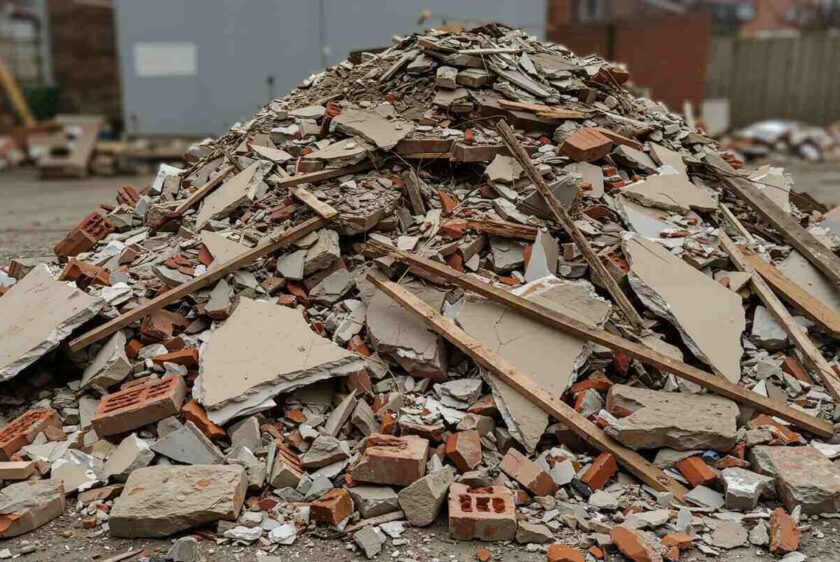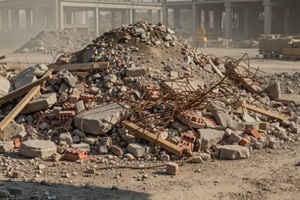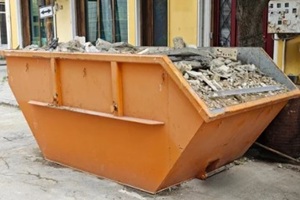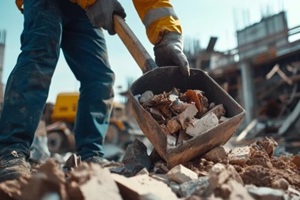
What Qualifies as Construction Debris and What Doesn’t
Construction debris includes a range of waste types, each of which must be properly identified and disposed of accordingly. Companies have a responsibility to know when construction debris can be thrown away, when it can be recycled, and when hazardous debris must be safely removed in accordance with local and state regulations.
This article provides a short guide on how to identify, classify, and dispose of different types of construction debris. Failing to know what qualifies as legitimate construction debris or hazardous waste can lead to costly mistakes for construction companies, contractors, and the home and business owners they serve.
What is Construction Debris and How Do I Dispose of It?

The definition of “construction debris” varies slightly by state. According to the Virginia Waste Management Board, construction debris refers to “solid waste that is produced or generated during construction, remodeling, or repair of pavements, houses, commercial buildings, and other structures.” It should not be confused with “debris waste,” which is waste resulting from land-clearing jobs.
This includes any materials typically involved in construction projects, including:
- Lumber
- Sheetrock
- Brick
- Wire
- Shingles
- Piping
- Concrete
- Glass
- Nails
- Rebar
- Plaster
The empty metal and plastic containers for these materials can also qualify as construction debris. Generally, any materials required for structural integrity qualify as construction material and, therefore, can create construction debris. However, not all types of construction debris are disposed of in the same way, so construction companies must classify their project waste accurately.
What is Hazardous Waste and How Do I Dispose of It?
In addition to construction debris, residential and commercial projects often produce hazardous waste. This is waste that must be identified and disposed of differently than construction debris in accordance with local, city, federal, and environmental codes. Failure to comply with the relevant regulations regarding hazardous waste can result in fines, legal punishment, and even license revocation for the company.
Examples of hazardous waste include:
- Paints
- Solvents
- Asbestos
- Coatings
- Liquids
- Strippers
- Thinners
- Lead
- Plasterboard
- Mercury
- Semi-liquids
- Compressed gases (aerosols)
- Fluorescent bulbs
- Tar
- Garbage

While some hazardous materials can be readily classified, such as paints and solvents, others may prove more difficult. For example, insulation can be classified as construction debris but not if it contains asbestos. While the plastic containers that transport construction materials can be considered construction debris, other types of waste, such as containers or bottles used by the workers themselves, would be considered hazardous waste.
Penalty and Enforcement for Improper Disposal
Construction companies have a responsibility to know the exact penalties and enforcement they will face if they knowingly or unknowingly fail to properly classify construction debris. For Virginia-based companies, the relevant code in the Virginia Waste Management Act is: § 10.1-1455 Penalties and Enforcement. This code states that anyone who transports, stores, or disposes of hazardous waste in an unpermitted way can be fined up to $32,500 and will be guilty of a felony offense. This includes jail time of 1-5 years in addition to the fine.
Additionally, separate violations are considered separate offenses. To legally operate in Virginia, construction companies must know how to classify and correctly dispose of each type of material to avoid these and other penalties.
How to Dispose of Construction Debris and Hazardous Waste
Once the debris has been classified, it must be disposed of according to industry standards and state laws. This brief breakdown by material type can help companies determine the proper procedure, but an experienced waste management company remains the best resource to manage waste safely and avoid penalties:
- Building Materials: Construction debris can be disposed of in a marked facility, but many of these materials can also be recycled or reused. Wood waste, for example, can be recycled for other projects. Plaster and cement can be crushed, collected, and reused by a recycling company.
- Dredging Materials: Construction projects may displace materials, such as trees, dirt, rocks, and other rubble. This material can be recycled by designated plants or removed by the waste disposal company.
- Hazardous Materials: These materials must be removed according to state, federal, and local laws. Only specific disposal points can handle chemical waste, and even storing or transporting this material improperly can result in harsh penalties.
- Plastic Materials: Plastic materials often accumulate during construction projects through direct disposal of PVC and PEX piping as well as indirect use, such as through styrofoam and plastic packaging for other materials. Different types of plastic materials often need to be removed to separate facilities, so waste management efforts need to account for how different plastics are classified.
Construction companies can avoid the time, money, and risk involved in self-regulated waste disposal by hiring an experienced waste management company. These companies shoulder the risk for construction companies by classifying and disposing of each material according to relevant rules and regulations.
Book Your Construction Debris Disposal in Hampton Roads, VA Today

Even complex legal guides to construction materials can leave gray areas for what qualifies as construction debris and what must be disposed of as hazardous material. An experienced waste management company can help construction companies by classifying waste, disposing of it according to local and federal regulations, and absorbing risk in the event of any disposal mistakes.
At Full Strut Disposal, we take responsibility for construction debris disposal to protect construction companies from the fines, reputational damage, and legal repercussions of improper waste management. Our experienced team can identify waste by type and dispose of it according to Virginia regulations, which can change at any time.
Contact our team today to learn how we help construction companies complete jobs efficiently, minimize delays, and save money by avoiding more costly waste removal processes.
"*" indicates required fields



